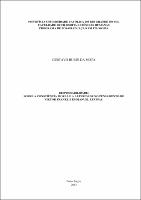| Share record |


|
Please use this identifier to cite or link to this item:
https://tede2.pucrs.br/tede2/handle/tede/2925Full metadata record
| DC Field | Value | Language |
|---|---|---|
| dc.creator | Mota, Gustavo Rubin da | - |
| dc.creator.Lattes | http://buscatextual.cnpq.br/buscatextual/visualizacv.do?id=K4492416D0 | por |
| dc.contributor.advisor1 | Souza, Ricardo Timm de | - |
| dc.contributor.advisor1Lattes | http://buscatextual.cnpq.br/buscatextual/visualizacv.do?id=K4760725Y7 | por |
| dc.date.accessioned | 2015-04-14T13:55:20Z | - |
| dc.date.available | 2014-01-07 | - |
| dc.date.issued | 2013-11-25 | - |
| dc.identifier.citation | MOTA, Gustavo Rubin da. Responsabilidade : sobre a consciência moral e a alteridade no pensamento de Viktor Frankl e Emmanuel Levinas. 2013. 111 f. Dissertação (Mestrado em Filosofia) - Pontifícia Universidade Católica do Rio Grande do Sul, Porto Alegre, 2013. | por |
| dc.identifier.uri | http://tede2.pucrs.br/tede2/handle/tede/2925 | - |
| dc.description.resumo | Responsabilidade é o termo de ligação entre o pensamento de Viktor Frankl e Emmanuel Levinas, pelo qual se coaduna a consciência moral como possibilidade de encontro com o outro humano. Consciência anterior à liberdade e a qualquer ato deliberado ou intencional do sujeito, em que o humano respondente pela indigência do outro, Mestre que reporta à quebra do monismo de um bio-psiquismo e sociologismo forte, cujo aspecto preponderante é a pessoa como responsável sobre toda a circunstância. Consciência anterior à inteligibilidade, enquanto Má consciência em que não se fecha numa circularidade do Mesmo, pondo em crise a egoidade e o sentido para sê-la encontrado e atualizado nos encontros e confronto com os sentidos sociais. Encontros por meio dos traços inscritos no rosto, epifenômeno da presença do outro e do Ausente, do Ele que é a alteridade que reconhece o outro em seu absoluto Dizer. Dizer pronunciável no fluxo do tempo de uma sensibilidade levada para o desinteresse e na entrada do Outrem como encontro anárquico e pela dissimetria, provocando no outro o trauma daquilo que seria a obviedade. Sentido da vida posto como responsabilidade anterior a qualquer iniciativa livre do sujeito, que diante do Outro recolhe os vestígios do terceiro, do Ele como infinição do olhar-rosto que fala ao eu, Desejo que o desordena em sua egoidade, e expõe o humano para justiça diante do outrem, absolutamente outro. Confronto com a responsabilidade diante da nudez e miséria de Outrem, que clama pela unicidade do um-respondente, tomando-o como refém na incondicional substituição nascente do apelo que surge da eleidade e conclama para a substituição, dar suporte ao que é mais no menos, do infinito na linguagem ética. | por |
| dc.description.abstract | Responsibility is the term connection between the thought of Emmanuel Levinas and Viktor Frankl, by which is consistent moral consciousness as a possible encounter with another human. Freedom and responsibility before any deliberate or intentional subject, in which the respondent by human indigence of another Master who reports to break the monism of a strong bio psyche and sociology, whose predominant aspect is the person in charge of any condition. Consciousness previous intelligibility while Bad conscience that does not close in a circularity of Even, putting into crisis selfhood and meaning to be found and updated in meetings and confrontation with the social meanings . Encounters through the traces inscribed in face epiphenomenon of the other's presence and Absent, the "He" that is the otherness that recognizes the other in its absolute say. Pronounceable say the flow of time in sensitivity brought to disinterestedness and input Others meeting as anarchical and dissymmetry, causing the other the trauma of what would be the obvious. Meaning of life post as liability prior to any free initiative of the subject, which collects on the Other traces of the third, the "He" look like infinitive - face that speaks to me, I want the clutter in your selfhood, and exposes the human to justice before the others, absolutely another. Confrontation with the responsibility of nakedness and misery of Others, which calls for the unity of the one- respondent, taking him hostage in unconditional replacement source of appeal arising from (Illeité) he-ity and calls for replacement, give support to the less is more, the infinite in ethical language. | eng |
| dc.description.provenance | Made available in DSpace on 2015-04-14T13:55:20Z (GMT). No. of bitstreams: 1 453071.pdf: 1049026 bytes, checksum: c653f56f532c6c806c05ae4bd9bbde81 (MD5) Previous issue date: 2013-11-25 | eng |
| dc.format | application/pdf | por |
| dc.thumbnail.url | http://tede2.pucrs.br:80/tede2/retrieve/11976/453071.pdf.jpg | * |
| dc.language | por | por |
| dc.publisher | Pontifícia Universidade Católica do Rio Grande do Sul | por |
| dc.publisher.department | Faculdade de Filosofia e Ciências Humanas | por |
| dc.publisher.country | BR | por |
| dc.publisher.initials | PUCRS | por |
| dc.publisher.program | Programa de Pós-Graduação em Filosofia | por |
| dc.rights | Acesso Aberto | por |
| dc.subject | FILOSOFIA | por |
| dc.subject | ÉTICA | por |
| dc.subject | RESPONSABILIDADE | por |
| dc.subject | FRANKL, VIKTOR EMIL - CRÍTICA E INTERPRETAÇÃO | por |
| dc.subject | LEVINAS, EMMANUEL - CRÍTICA E INTERPRETAÇÃO | por |
| dc.subject.cnpq | CNPQ::CIENCIAS HUMANAS::FILOSOFIA | por |
| dc.title | Responsabilidade : sobre a consciência moral e a alteridade no pensamento de Viktor Frankl e Emmanuel Levinas | por |
| dc.type | Dissertação | por |
| Appears in Collections: | Programa de Pós-Graduação em Filosofia | |
Files in This Item:
| File | Description | Size | Format | |
|---|---|---|---|---|
| 453071.pdf | Texto Completo | 1.02 MB | Adobe PDF |  Download/Open Preview |
Items in DSpace are protected by copyright, with all rights reserved, unless otherwise indicated.




